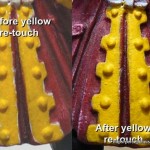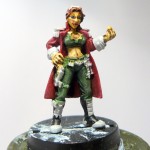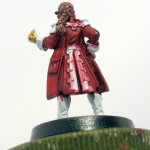Really good read over at Topless Robot – The 7 Sci-Fi Shows That Deserved Better Endings
You should go read it, while I should think about writing a post covering some other series endings.

Really good read over at Topless Robot – The 7 Sci-Fi Shows That Deserved Better Endings
You should go read it, while I should think about writing a post covering some other series endings.
 I often find that with miniatures the end sneaks up on you, and it’s no different with Sasha. One moment I was looking and thinking there was a lot of work ahead, and the next minute, she’s done. Done in the sense that the main figure is done, the base is clearly not done, but I haven’t properly based a miniature for about 10 years since all I do when they’re finished is stick them in a foam box. So, this is part seven in a seven or maybe eight part diary about painting Sasha DuBois (other parts are one, two, three, four, five, six).
I often find that with miniatures the end sneaks up on you, and it’s no different with Sasha. One moment I was looking and thinking there was a lot of work ahead, and the next minute, she’s done. Done in the sense that the main figure is done, the base is clearly not done, but I haven’t properly based a miniature for about 10 years since all I do when they’re finished is stick them in a foam box. So, this is part seven in a seven or maybe eight part diary about painting Sasha DuBois (other parts are one, two, three, four, five, six).
Yesterday (Saturday as I write this) we popped out after breakfast to Hobbycraft and Maplins and picked up a few things. Some acrylic extender which I’ve been after for a while, a magnifying visor, a brush stand and a few other items. Acrylic extender prevents the paint drying so quickly which is useful when it’s very thin, which in turn is very useful when using small brushes and detail work. I tested the visor on a couple of other miniatures and then set about Sasha’s yellow bits. The extender is really excellent, keeping the paint on the brush useful even when moving slowly with small amounts of paint, and the visor is good enough to let me see some real detail. The picture just above shows the panels on the back of the figure before and after the second layer. That layer was put on using the extender and the visor. That was all that got done on the figure on Saturday. There’s a few of photo’s of that stage after the cut …
 This is part six in an increasingly long painting diary for my Sasha DuBois miniature. There were five parts before this, which you can get to in order from here, 1, 2, 3, 4, 5. One of the most crucial things this diary has taught me is that no matter how good you think your painting is, no matter how well you think you covered an area, no matter how fine you think the line you just painted was, photographing it with a 7 megapixel camera and blowing it up will prove you wrong. In some ways it’s quite handy, for example I’ve just come to the end of a session working on Sasha, and reviewing the photo’s shows me some places where I need to look a little harder and touch the various colours up a little bit. I guess with a magnifying glass /visor I may be able to see that kind of detail, but when holding the miniature normally and painting it at the moment I can’t.
This is part six in an increasingly long painting diary for my Sasha DuBois miniature. There were five parts before this, which you can get to in order from here, 1, 2, 3, 4, 5. One of the most crucial things this diary has taught me is that no matter how good you think your painting is, no matter how well you think you covered an area, no matter how fine you think the line you just painted was, photographing it with a 7 megapixel camera and blowing it up will prove you wrong. In some ways it’s quite handy, for example I’ve just come to the end of a session working on Sasha, and reviewing the photo’s shows me some places where I need to look a little harder and touch the various colours up a little bit. I guess with a magnifying glass /visor I may be able to see that kind of detail, but when holding the miniature normally and painting it at the moment I can’t.
 This is the fifth post in the Sasha DuBois painting diary set (the others are one, two, three and four). I’m a bit up and down about my painting skill level at the moment (my regular normal state for anything I create), some days thinking I’m quite happy with my skill level thank you very much and other days a bit down because I feel I should be better, if I just spent a bit more time. However, I spend as much time as I spend and I enjoy that time and at the end of the day that’s what truly matters, it’s relaxing and enjoyable. I’m happy with being slightly better than barely average (at the moment).
This is the fifth post in the Sasha DuBois painting diary set (the others are one, two, three and four). I’m a bit up and down about my painting skill level at the moment (my regular normal state for anything I create), some days thinking I’m quite happy with my skill level thank you very much and other days a bit down because I feel I should be better, if I just spent a bit more time. However, I spend as much time as I spend and I enjoy that time and at the end of the day that’s what truly matters, it’s relaxing and enjoyable. I’m happy with being slightly better than barely average (at the moment).
At the end of the fourth post I’d just put the base coat onto the coat (this could get confusing), using scab red. I then spent a little while (a few days) not really painting anything, and finally got back into the swing by putting a lot of effort into the zombies. I also managed to wash and brush the coat on this mini and then put some black onto the boots (too thickly, sigh). Anyway.
One of the founders of Oblong Industries served as a consultant on the movie Minority Report, and the computing interface you see in that movie was developed based on work he did at MIT. Now his company have made it a reality. Really. Check this video,
I’m sure that the data and the input method is strongly tied together but in a few years this is going to be truly amazing. Of course, we’ve been seeing this kind of thing in fiction and movies for quite a while (Johnny Mnemonic springs to mind), but if we finally have real world applications then that’s quite exciting.
I would dearly love to have a go at one of these, although I’ve got no idea what I’d do (probably write a blog post, I guess not the most efficient method).
It appears to me, an uneducated sci-fi geek wannabe, that if the human mind can conceive of it, eventually we can bring it to fruition. What was fiction in the early part of the last century is the reality of today.
I’ve just been watching a TV program which included robotic limbs, both as human limb replacements and as human limb extensions (for remote use in dangerous locations). Limbs controlled by tiny electrical impulses from muscles, or by thought alone. Semi-realistic limbs, with 4 or 5 mobile and flexible fingers. Rather than guessing where we’ll be in 10 years, it’s easier to look back at where we were 10 years ago and imagine if we make the same rate of progress.
The same is true in so many areas of traditional sci-fi topics such as robotics, space travel, energy, communication. I remember watching the black and white Flash Gordon and thinking how awesome it would be, to be able to see the person you were talking to on the phone.
Now video conferencing and videophone technology is increasingly commonplace.
It appears that at all scales (from space travel to the moon to the tiny elements of motors and computers), if sci-fi authors have imagined it, then science practitioners have brought it about and made it a reality.
I am sure that people more clever than me debate this all the time. Asking questions about whether we make our own reality and hence anything we imagine can be made real, or that since sci-fi is based on a kernel of reality it’s bound to be possible to develop the ideas into real stuff. But for me, I just like thinking about it. Does sci-fi drive science research? If you spent your youth watching C3-PO does that in turn result in your Robotics research taking the form of a large golden humanoid with a personality disorder?
Is it inevitable that most of the inventions of science fiction will become reality?
Time paradoxes make inherently confusing stories, so it’s critical that you connect with the characters and feel the plot has some value otherwise you’ll be left drifting. Deja Vu manages enough to keep you interested, keep you wanting to see more, and keeps you caring about the two main characters.
The screenplay is clever but doesn’t try to overstretch and there are no attempts to explain the paradoxes, and plenty of in-story explanations of why time travel is a really bad thing[tm].
The performances are solid, Denzel is interesting and believable, Paula plays the small amount of time she has on screen pretty well. I’m not entirely convinced their actions in the latter half of the movie make much sense, but I’m willing to suspend disbelief to let the story play out. There’s some action, some cute effects, some nice ideas and a certain level of suspense especially towards the finale.
The ending was kept hidden pretty well, and although I finally realised how it would play out just before it actually did it was worth the wait. No shocking last moment twists, no huge discovery, just a decent ending for a decent movie.